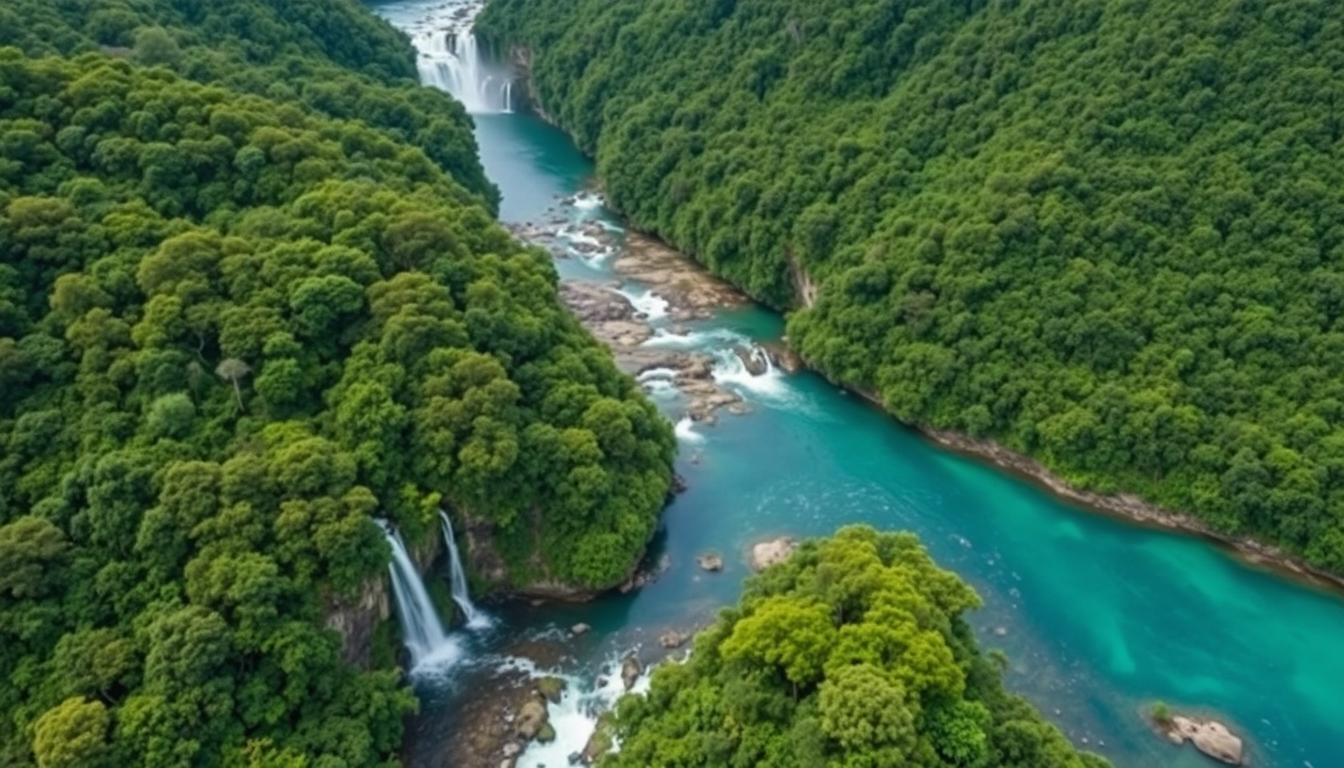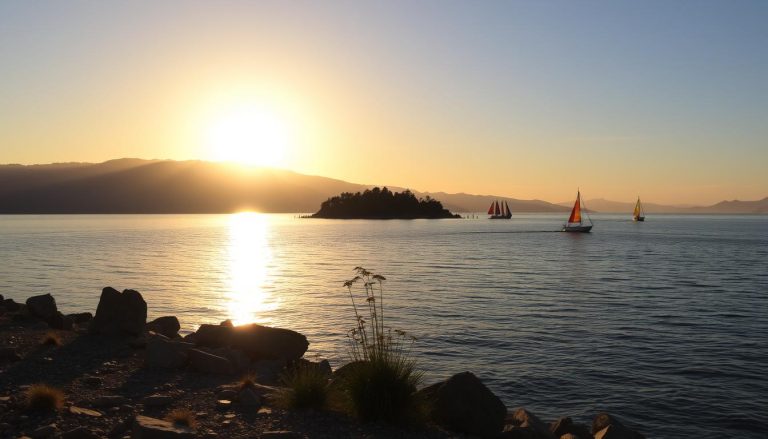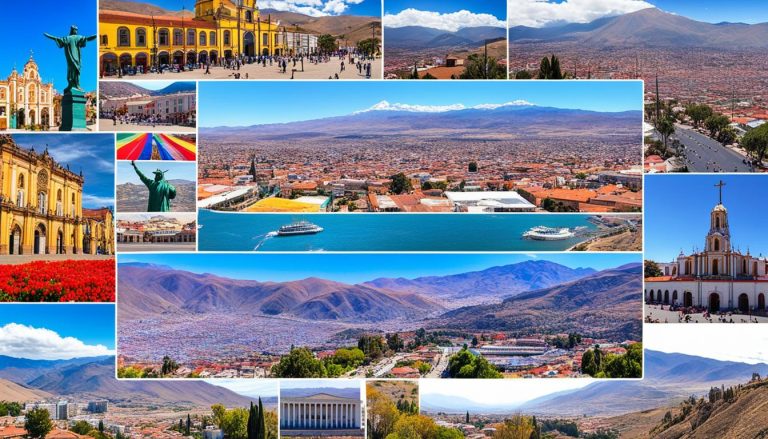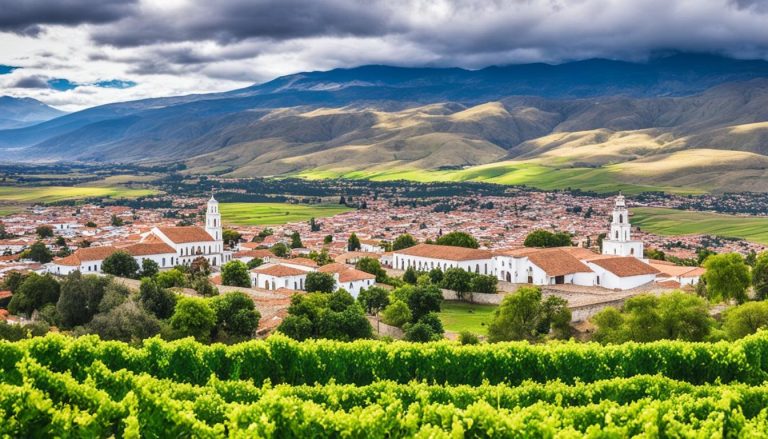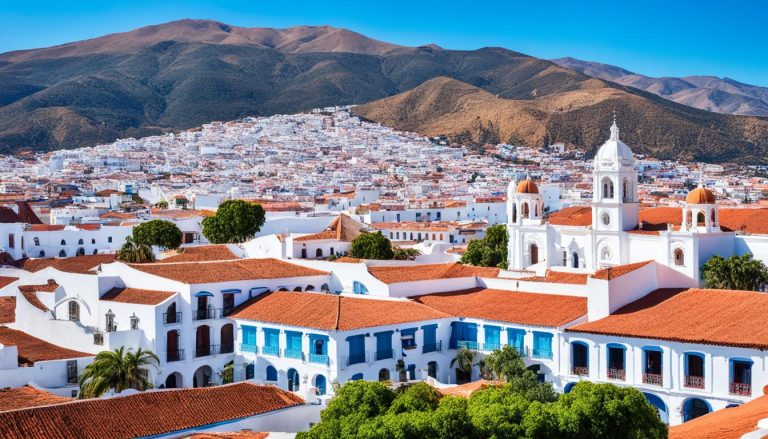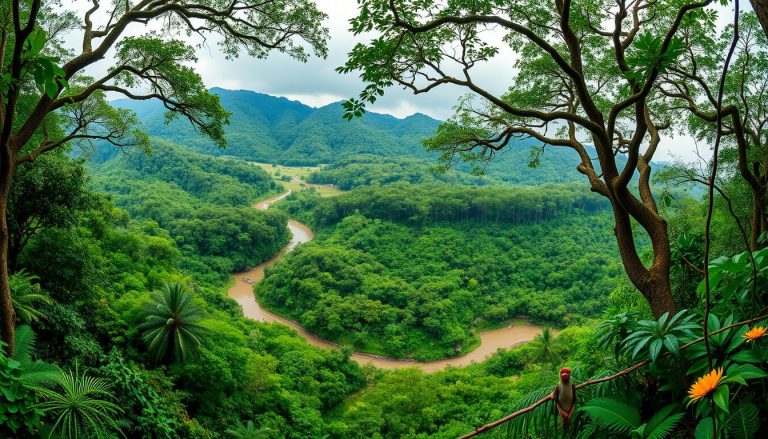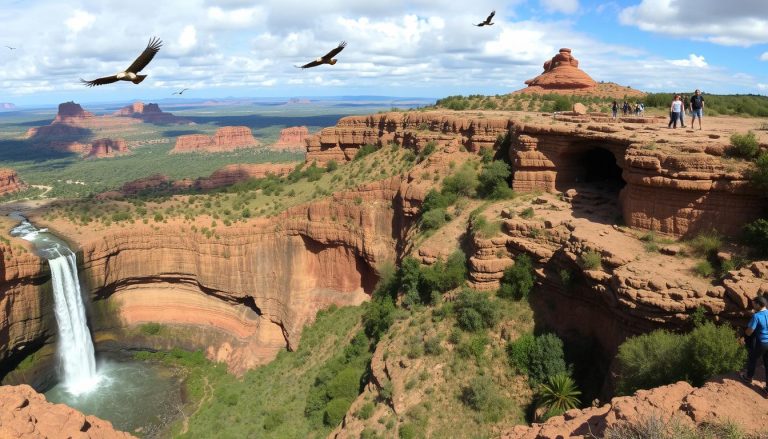Amboro National Park is a gem in Bolivia, known for its incredible variety of plants and animals. It sits in three unique areas: the Andes foothills, the northern Chaco region, and the Amazon Basin. Here, you can enjoy thrilling outdoor activities like hiking through cloud forests and looking for rare animals like the Andean spectacled bear and jaguar.
The park is surrounded by peaceful landscapes and has a deep cultural history. It’s perfect for those who love nature and adventure. Amboro National Park is a place you can’t miss if you’re into exploring the outdoors.
So, what makes Amboro National Park special? What are the top things to do that will amaze you? Let’s find out the best parts of this Bolivian treasure together.
Key Takeaways
- Amboro National Park is one of the most biodiverse protected areas in Bolivia, with over 1,000 bird species.
- The park includes three unique ecosystems: Andes foothills, northern Chaco region, and Amazon Basin.
- There are many outdoor adventures, like tough hikes and seeing rare animals like the Andean spectacled bear and jaguar.
- Amboro National Park is a mix of natural beauty, culture, and endless exploration opportunities.
- It’s a top spot for nature lovers and adventure seekers, offering an unforgettable experience in Bolivia.
Introduction to Amboro National Park
Geographical Location and Biodiversity
Amboro National Park sits in eastern Bolivia, in the Santa Cruz department. It covers over 630,000 hectares. This park is famous for its diverse ecosystems. The north has the lush Amazon rainforest, the south has the dry Chaco scrublands, and the middle is the foothills of the Andes mountains.
Significance of the Park
Amboro is a hotspot for over 900 bird species and many endangered animals like the Andean spectacled bear and jaguar. It’s one of the most biodiverse places in Bolivia and the world. It has been given the UNESCO Biosphere Reserve title.
The park is key to protecting Amazonian and Andean ecosystems. It’s home to many plants and animals. Conservation efforts are in place, with the Bolivian government and international groups working to protect it. Amboro also offers jobs and promotes sustainable living for local communities.
| Key Facts about Amboro National Park | Details |
|---|---|
| Location | Eastern Bolivia, in the department of Santa Cruz |
| Total Area | 630,000 hectares |
| Ecosystems | Amazon rainforest, Chaco scrublands, Andes foothills |
| Biodiversity | Over 900 bird species, Andean spectacled bear, jaguar |
| Accolades | UNESCO Biosphere Reserve |
| Conservation Efforts | Ongoing collaboration between Bolivia and international organizations |
| Ecotourism Potential | One of Bolivia’s premier ecotourism destinations |
“Amboro National Park is recognized as one of the most biodiverse protected areas not just in Bolivia, but on the entire planet.”
Exploring the North Side of Amboro National Park
The northern part of Amboro National Park is a top spot for visitors to see the park’s amazing variety of life. It has many official entry points like Mataracu, La Chonta, Macuñucu, Saguayo, and Ichilo. These spots let visitors into the park’s vast network of trails. These trails take trekkers deep into the Amazon rainforest, through thick greenery, and over streams and rivers.
Visitors can see different ecosystems, from cloud forests to areas by rivers, each full of unique plants and animals. The specific trail and entry point determine what you’ll see.
Popular Entrance Points and Trails
Exploring the Amboro National Park north side is best with a local expert. Tour companies in towns like Santa Cruz and Samaipata offer guided trips to the Amboro north side. These trips range from day hikes to longer treks. They include transport, guides, camping gear, and food, making it easy and safe to see the park’s hidden spots.
Guided Tours and Activities
Guided tours in the Amboro north side also include activities like spotting wildlife, night safaris, and visiting remote communities. These activities give a full view of Amboro’s nature and culture.
“Amboro National Park has more bird species than Costa Rica, making it a significant birdwatching destination.”
| Entrance Point | Activities | Duration |
|---|---|---|
| Mataracu | Trekking, Wildlife Viewing | 1-2 Days |
| La Chonta | Hiking, Night Safari | 1 Day |
| Macuñucu | Birdwatching, Cultural Visits | 2-3 Days |
| Saguayo | Trekking, Camping | 2-4 Days |
| Ichilo | Hiking, River Exploration | 1-2 Days |
Amboro National Park, Bolivia: Best Things to Do - Top Picks
Amboro National Park in Bolivia is a place full of activities and experiences. It shows off its amazing natural beauty and variety of life. Whether you want exciting adventures or a calm walk through nature, Amboro has it all.
Some of the top things to do in Amboro National Park include:
- Challenging hikes to breathtaking viewpoints that offer panoramic vistas of the park’s rugged terrain and lush rainforest
- Immersive wildlife watching and birdwatching tours that allow you to encounter an abundance of rare and endemic species
- Opportunities for overnight camping under the stars, allowing you to fully immerse yourself in the park’s serene atmosphere
- Exploration of remote corners of the Amazon rainforest, uncovering the park’s rich cultural heritage and interacting with local communities
Amboro National Park has different ecosystems, from cloud forests to tropical dry forests. It’s a true highlight of the Bolivian ecotourism experience. Whether you want exciting adventures or a peaceful walk, this place has something for everyone.
| Amboro National Park Highlights | Key Activities |
|---|---|
| Breathtaking Viewpoints | Challenging Hikes |
| Abundant Wildlife | Wildlife Watching, Birdwatching |
| Serene Landscapes | Overnight Camping |
| Rich Cultural Heritage | Cultural Immersion |
Amboro National Park is a top spot for ecotourism and outdoor fun. It gives visitors many chances to dive into Bolivia’s natural beauty.
Trekking and Hiking Adventures
Amboro National Park is a dream spot for those who love the outdoors. It has many hiking trails that let you dive into its varied landscapes. You can choose from tough treks through the Amazon rainforest or easy day hikes to stunning viewpoints.
Challenging Hikes and Viewpoints
For those who seek adventure, Amboro National Park has many tough hikes. These trails take you up the Andean foothills and deep into the rainforest. At the end, you’ll find amazing views of hills, valleys, and peaks.
The hard work of these hikes is worth it. From the top, you get to see Amboro’s beauty like never before.
- Tackle the challenging hike to the Cerro Amboro viewpoint, which offers a 360-degree panorama of the park’s diverse landscapes.
- Embark on a multi-day trekking expedition through the dense Amazon rainforest, navigating winding trails and ascents to reach remote, elevated perspectives.
- Discover hidden waterfalls and cascades by following the park’s network of challenging hiking trails, each offering a unique and rewarding experience.
No matter if you’re an expert hiker or just starting out, Amboro National Park has something for you. With the right gear and a sense of adventure, you can see the park’s beauty from incredible spots. You’ll also get to experience its untouched nature up close.
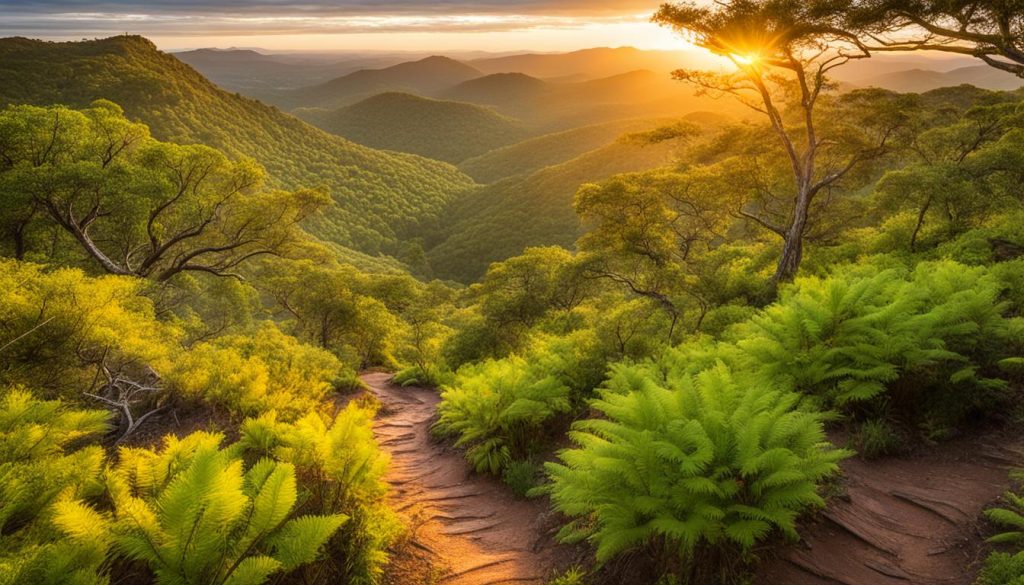
Wildlife Watching and Birdwatching
Amboro National Park is a paradise for those who love wildlife. It has over 900 Amboro National Park birdwatching species. This is more than any other protected area in Bolivia and even more than Costa Rica is known for. You can see everything from colorful toucans and parrots to the rare Amboro National Park jaguar and the beautiful Amboro National Park spectacled bear.
Guided tours and wildlife-watching trips are the best way to see these amazing animals. You might see flocks of colorful birds or a jaguar in the wild. The park is also home to many Amboro National Park endangered species. This makes it very important for conservation.
The park ranges from the Andes foothills to the Amazon rainforest. It has many different ecosystems full of life. With expert guides and well-kept trails, visitors can explore the park’s wonders. They can see the incredible variety of life that makes this place special.
“Amboro National Park is a true paradise for wildlife enthusiasts, where the boundless diversity of nature leaves a lasting impression on all who visit.”
If you love birdwatching, wildlife photography, or just nature, you must visit Amboro National Park. It’s a place where amazing animals live. Get ready to be amazed by the incredible animals of this remarkable park.
Camping and Overnight Stays
For those seeking a deeper connection with nature, camping overnight in Amboro National Park is a great choice. At places like La Chonta, you can find basic camping spots with tents, sleeping pads, and simple bathroom facilities. Or, you can join guided tours that include camping gear and meals. This lets you fully experience the Amazon rainforest’s beauty and sounds.
Camping Facilities and Accommodations
The camping spots in Amboro National Park are simple, but the chance to sleep under the stars is unforgettable. If you prefer more comfort, some tours let you stay in nearby towns and villages. This way, you get to enjoy nature and still have some modern comforts.
| Camping Facility | Amenities | Approximate Cost |
|---|---|---|
| La Chonta Camping Area |
| $10-$20 USD per person per night |
| Guided Trekking Tours with Camping |
| $50-$100 USD per person per day |
| Nearby Lodging in Towns/Villages |
| $30-$80 USD per person per night |
The camping in Amboro National Park is all about connecting with nature and the rainforest’s rhythms. Whether you choose a rustic site or a cozy lodge, the memories you make will last a lifetime.

Cultural Immersion and Local Communities
Amboro National Park is not just about nature. It’s also a place to dive into the rich culture of local communities. Here, you can meet indigenous groups with their own traditions and ways of life. By connecting with these communities, you learn how the natural world and local people are deeply linked.
Many tours in the area let you visit these communities. You’ll see their traditional ways of living, their crafts, and their spiritual beliefs. These tours help you understand the park’s history better. They also support the local economy and help communities grow.
When you support these tours, you help keep the area’s culture alive. You also learn about the diverse cultures that have lived in Amboro National Park for a long time.
| Cultural Experiences in Amboro National Park | Key Highlights |
|---|---|
| Visiting Indigenous Communities |
|
| Community-Based Tourism Initiatives |
|
Exploring Amboro National Park’s culture lets you see how the land and people are connected. It’s a chance to appreciate the deep bond between nature and the indigenous communities.
Best Time to Visit Amboro National Park
Amboro National Park in Bolivia has a tropical climate with wet and dry seasons. Each season offers unique experiences for visitors. The best time to visit depends on what you want to do and see.
Seasonal Considerations
The dry season, from May to October, is the peak visiting time. The weather is dry, and trails are easy to walk on. It’s perfect for hiking, seeing wildlife, and camping. The entrance fee is 15 Bolivianos, and tours cost between 350 Bolivianos for two and 150 Bolivianos for five people.
The rainy season, from November to April, can be challenging due to wet trails. But, it’s a great time to see the park’s lush greenery and migratory birds. Accommodation prices, like dorm beds at Hostel Serena in Samaipata, start at 76 Bolivianos per night, including breakfast.
It’s crucial to plan your visit to Amboro National Park well, considering the weather, river levels, and any travel issues. By doing so, you can make sure your trip meets your interests and expectations.
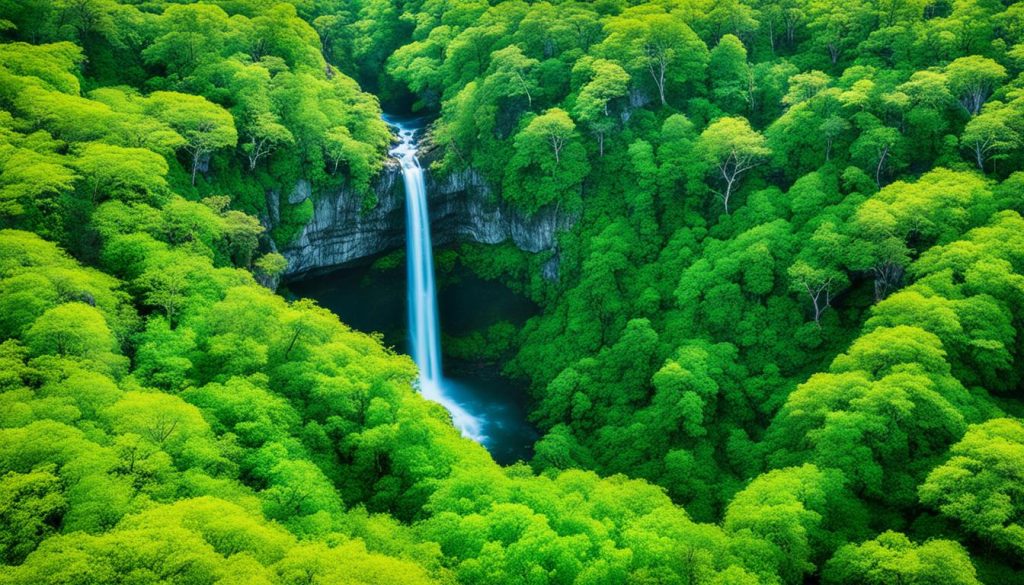
Planning Your Trip to Amboro National Park
Going to Amboro National Park in Bolivia needs some planning for a great trip. The park is far away, so book your activities and places to stay early. You can get to the park from towns like Santa Cruz or Samaipata by tour operators or private taxi.
Start by learning about the Amboro National Park entrance fees. These fees are often part of guided tours, but remember to include them in your budget. Also, know the park’s rules, like needing a local guide for some areas.
Travel Logistics and Preparation
Here are some important things to think about for Amboro National Park travel:
- Transportation: You can get to the park from places like Santa Cruz by tour operators or taxis. The drive takes about 1.5-2 hours.
- Accommodations: There aren’t many places to stay in the park, so book early. Many tours include where to stay.
- Packing: Make sure you have the right gear for your activities, like hiking boots, rain gear, and sun protection. Don’t forget camping gear if you’re staying overnight.
- Guided Tours: Some parts of Amboro National Park need a guide. You can book tours with local operators.
Plan and prepare well to have a memorable and safe trip to this amazing Bolivian park.
Safety and Responsible Tourism
When you visit Amboro National Park in Bolivia, you promise to be a responsible tourist. It’s important to listen to local guides and follow the park’s rules. These rules help protect the park’s wildlife and nature.
To be a good visitor, stay on the paths, don’t litter, and respect the local people and their ways. Also, be ready for the tough hike by bringing the right gear and knowing your limits.
By showing care for the environment and respect for local culture, you help protect Amboro National Park. This way, it will continue to amaze and inspire people for years to come.
Prioritizing Safety in Amboro National Park
Staying safe in Amboro National Park means planning and being careful. Here are some tips:
- Listen to guides who know the park well and can warn you about dangers.
- Wear the right hiking gear, like strong shoes, sun protection, and bug spray.
- Drink plenty of water and be aware of the heat and the challenge of hiking in a tropical place.
- Learn about the park’s emergency plans and how to call for help if you need it.
Promoting Sustainable Practices
Choosing sustainable tourism helps keep Amboro National Park’s nature and culture safe. Here’s how you can help:
- Keep to the marked paths to protect the land.
- Throw away trash properly, either by taking it with you or using park trash bins.
- Buy from local shops and join in community tourism to support the area.
- Respect the privacy and traditions of the people living in the park.
By focusing on Amboro National Park safety and responsible tourism, you help protect the environment and support sustainable ways. This way, future generations can also enjoy this amazing place.

Conclusion
Amboro National Park in Bolivia is a true gem. It offers visitors a chance to dive into the Amazon rainforest and Andean foothills. You can enjoy challenging hikes, wildlife-watching, cultural experiences, and camping under the stars.
This park is known for its amazing biodiversity and rich culture. It shows Bolivia’s effort to protect its natural beauty. Whether you want adventure or a peaceful trip, Amboro National Park will leave a lasting impression. It makes you appreciate the beauty of our planet more.
When planning your trip to Amboro National Park, make sure to explore its stunning northern areas. You can also enjoy wildlife-watching and cultural experiences. This park is perfect for anyone wanting to connect with Bolivia’s natural and cultural wonders.
